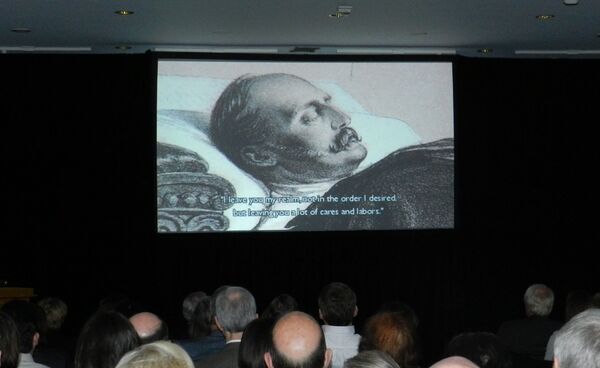WASHINGTON, April 16 (By Maria Young for RIA Novosti) – A little-known friendship between Russia’s Tsar Alexander II and US President Abraham Lincoln in the mid-1800s came to light in a documentary shown in the United States for the first time Monday evening at the Library of Congress in Washington, and organizers of the event hope it can serve as a model for US-Russian relations today.
“This film ought to be in the schools. American children should know what a marvelous history we share with the Russians, and they don’t,” said former US Rep. James Symington, chairman of the nonprofit American-Russian Cultural Cooperation Foundation(A-RCCF), which arranged the screening of “The Tsar and the President: Alexander II and Abraham Lincoln, Liberator and Emancipator.”
As for the US administration, Symington said, “I don’t think they even understand Russia as well as they should because Russia is our friend, basically, through the ages, and that’s never been looked at.”
“It’s really hard to build a future when we don’t have historic perspective, and the truth is that Russia at the time of the US Civil War was the only friend of the United States. The US had absolutely no one who was on their side, so Russia was the only one,” said A-RCCF Executive Director Alexander Potemkin in an interview with RIA Novosti.
“In showing this film my hope and I think the hope of our board is that we can remember this and build on these positive things,” he added.
The 25-minute documentary, produced in Russian with English subtitles, explores a warm and cordial correspondence between Tsar Alexander II, the heir-apparent to the throne who enjoyed a privileged life from his earliest years, and Abraham Lincoln, the second child of a poor family who lived in a one-room log cabin, a self-educated lawyer who rose to power through political office.
During his reign, Alexander II wrote a series of letters to American presidents, but it was the exchange with Lincoln that reveals a personal friendship reflected in political actions that came at a crucial time for the United States.
“These were warm, friendly, familial letters between the two, not at all political, one announcing the birth of a grand duke in the family. It was all very warm, ending with ‘Wishing you great success,’ and ‘God’s love on your country,’” said Marilyn Pfeifer Swezey, a guest curator for A-RCCF who produced the US version of the 2009 exhibition entitled “The Tsar and the President,” a collection of more than 200 documents, photos and letters that form the basis for the film.
The exhibit opened in Russia in 2011, and the film debuted there. Organizers hope to show it in New Jersey and say they have also received interest from the Reagan Library in California.
Though the two men never met, and came from vastly different backgrounds, there are odd similarities. Both freed slaves in their respective countries, Alexander II with a manifesto that abolished serfdom, signed in 1861, and Lincoln with the Emancipation Proclamation, issued in 1862 and signed in 1863. And both were later assassinated.
With the United States in the throes of a debilitating civil war, “Russia was the only European country that supported the cause of the union (the North). Russia was asked, Alexander II was approached by England and France to join them in supporting the South, the confederacy, and he refused,” Swezey said.
Months later, in September of 1863, shortly after the North had lost several bloody battles, two Russian Navy squadrons arrived in America. They served as a symbol to the South and its allies that there was a barrier for any ships sent to support the confederacy.
“When the Russian fleet arrived in New York and several months later in San Francisco, Lincoln and all the officials in Washington were overwhelmed and said ‘Thank God for the Russians.’ They received the news as a powerful sign of support,” said Swezey.
“Russian-American relations right now are not very good and it’s really important to point out how close and friendly they were in the past. Maybe we should think differently about Russia, and we should think again about the fact that Russia really was a great friend in the past and I would think would be again a great friend,” she added.


